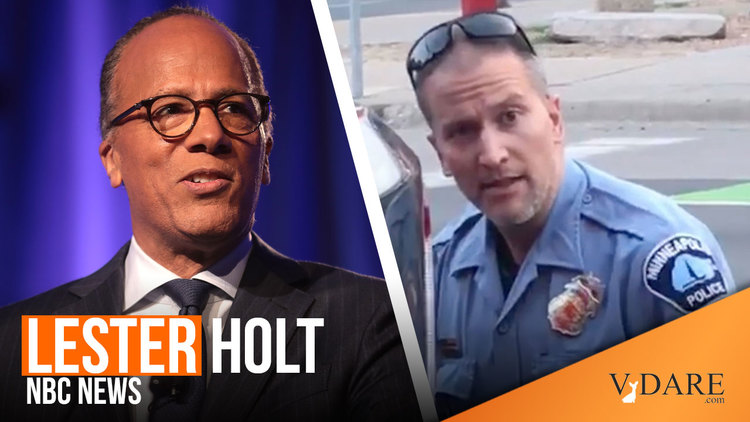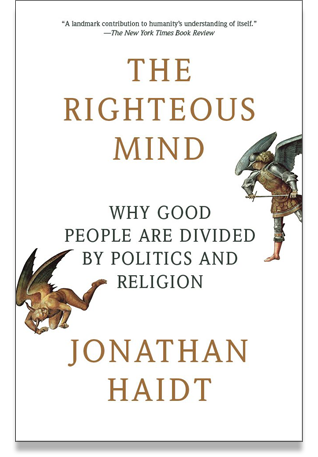
By Lance Welton
04/10/2021
NBC Nightly News Anchor Lester Holt recently declared that “it has become clearer that fairness is overrated,” adding that “the idea that we should always give two sides equal weight and merit does not reflect the world we find ourselves in” [Jonathan Turley: Will the press ever cover the Hunter Biden news fairly?, The Hill, April 3, 2021]. Holt is black. He was previously noted for his bias in “moderating” a debate between Donald Trump and Hillary Clinton [NBC’s Lester Holt emerges from debate bruised and partisan, by Joe Concha, The Hill, September 27, 2016]. Similarly, the Black Lives Matter movement, which involves blacks and mentally unstable whites, has made it clear that, regardless of devastating contrary evidence, they will riot — “cities will burn” — if Derek Chauvin, the police officer involved in the death of black criminal George Floyd, is not found guilty of murder [Black Lives Matter issues ominous warning: “Cities will be on fire” if Chauvin is not convicted of killing Floyd, by Patrick Henry, Law Enforcement Today, April 5, 2021]. Question: could blacks possibly not care as much about “fairness” as white people? Answer: yes.
“Fairness” is usually defined as something like “impartial and just treatment or behaviour without favoritism or discrimination.” This is a high-order value which demands that you put aside nepotism, ethnocentrism, and even personal gain. It is an abstraction that requires putting aside your gut reaction in order to reason morally.
Moral reasoning, abstract thinking, the following of rules, belief in and participation in the democratic process, not being ethnocentric and simply trust in others and institutions, are all factors that correlate with intelligence. All of these traits directly relate to the ability to judge a situation impartially, rather than act impulsively or according to one’s self-interest or one’s group interests.
In that the average IQ of American blacks is 85, compared to 100 for whites, we would expect black people to have a less developed concept of “fairness.” American blacks have also been shown to be more ethnocentric than whites, more desirous to be with their own kind, and to discriminate against those who are not their kind [Stereotypes and ethnocentrism, by C. Judd et al., Journal of Personality and Social Psychology, 1995].
In addition, going beyond IQ, there are consistent personality differences between blacks and whites. Blacks are lower in Agreeableness, which makes them less trusting than whites and more selfish and Machiavellian. It also means they are higher in Self Esteem and in a sense of entitlement. And they are lower in Conscientiousness (rule-following, impulse control), which makes them more emotional, more impulsive and less able or willing to follow rules [see Race, Evolution, and Behavior, by J. Philippe Rushton, 1995].
Thus, Blacks’ personalities, as well as their lower intelligence, would imply that they are less likely to value “fairness.” They are more focused on what they perceive as good for them.
This is the child’s understanding of “fairness.” If I don’t get what I want then it’s “unfair,” because I deserve everything I want.
And, in fact, a number of studies have shown the Blacks — like children — feel a sense of unfairness, in relation to themselves, far more keenly than whites do. A study in 1983 in which black and white students were asked to imagine someone being promoted over somebody else, with the only variable being that they were a different race from the student, found that
…black subjects perceived more unfairness operating in the situations than white subjects, and they saw the promoted employee as less qualified than white subjects did. As expected, black subjects perceived the white employee’s promotion over the black employee as the most unfair while white subjects saw no difference among the situations.
[Racial and Gender Differences in Perceptions of Fairness, by M. Sherman et al., Perceptual and Motor Skills, 1983]

In other words, for whites “fairness” means just how I defined it earlier — “impartial and just treatment or behaviour without favoritism or discrimination.” For blacks, “fairness” means what is good for them.
Psychologist Jonathan Haidt has argued in his book The Righteous Mind that humans have five “Moral Foundations.” There are “binding foundations” that reflect adaptation to being in a group (obedience to authority, in-group loyalty and sanctity) and "individualizing foundations," focused on what is good for individuals: not getting harmed and making sure that they get at least an equal share. Thus, people who are not “at the top” will fight for the importance of these foundations and play for status by signaling how strongly they are concerned about them. Individualists — selfish people — focus on the “individualizing foundations.” They don’t want to make sacrifices for the group. So “individualists” are much more likely to feel that a situation is “unfair” because they don’t take into account how “fair” it might be for other people, or for the group as a whole. They only care about fairness for them, which means that they get at least the same as everybody else.
In contrast, people who are trusting, and thus more group-oriented, are more likely to believe that they are being treated fairly [Fair treatment, fair play? The relationship between fair treatment perceptions, political trust and compliant and cooperative attitudes cross‐nationally, by S. Marien & H. Werner, European Journal of Political Research, 2018].
Haidt’s work does not focus on race specifically, but other studies have found race differences. There is evidence that blacks are more sensitive to apparently “unfair” proposals from other blacks than whites are to such proposals from other whites [Racial Differences in Inequality Aversion: Evidence from Real World Respondents in the Ultimatum Game, by John Griffin et al., Journal of Economic Behavior and Organization, 2012].
Blacks also see the criminal justice system as biased against them [And Justice for Some: Race, Crime, and Punishment in the US Criminal Justice System, by J. Huritz & M. Peffley, Canadian Journal of Political Science] despite numerous studies showing that it is in fact eminently fair toward them [see Why Race Matters, by Michael Levin, 2005, Chapter 9.1: Black Crime].

Based on these studies, the reasonable conclusion is that Blacks seem to have less of a concept of “fair play” than whites.
Whites can sometimes value “playing the game” over “winning” if they lose “fair and square.” Blacks are much less likely to see the world in that way.
“Fairness” is over-rated if you live in an eat-or-be-eaten world of low trust. And that is their world.
Which is why, even if Officer Derek Chauvin is objectively innocent according to “the rules,” it will still appear “unfair” to blacks if he is not found guilty.
Or, as the inscription on the Jefferson Memorial would read if not censored:
Nothing is more certainly written in the book of fate than that these people are to be free. Nor is it less certain that the two races, equally free, cannot live in the same government. [Emphasis added].
Lance Welton is the pen name of a freelance journalist living in New York.
This is a content archive of VDARE.com, which Letitia James forced off of the Internet using lawfare.